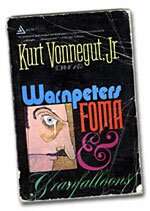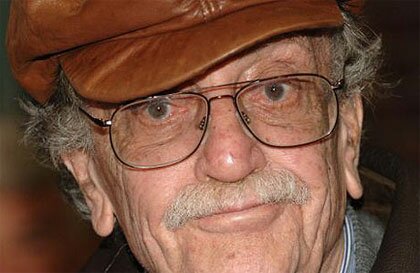God Bless You, Mr. Vonnegut (Reprise)

Announcer: When Kurt Vonnegut died in April, something died in Commentator Philip Baruth too. But the other night he discovered a rare Vonnegut paperback at his local supermarket, and that has made all the difference. Here’s Philip.
Notes from the New Vermont
Commentary #208: God Bless You, Mr. Vonnegut
At the very front of my local mega-supermarket there’s a long table covered with books. It doesn’t seem to belong there, this table, because the books are used paperbacks, some yellow with age. Everything else in the store is blindingly new and fresh, but not these books, sales of which may benefit a charity of some kind — I’ve never been clear on that end of it.
What I do know is that the books are almost all romance novels, with titles like “Love’s Fury” and “Furious Love” and “The Year of Loving Furiously.”
I usually give the table a wide berth, because my life is a pretty precarious contraption, and any more love or fury could easily bring the whole thing crashing down.
 But the other night, I had an honest-to-God intuition: that if I searched through every single book on that table, I’d find something rare and strange and valuable.
But the other night, I had an honest-to-God intuition: that if I searched through every single book on that table, I’d find something rare and strange and valuable.
And there, under a stack at the back, I found it: a 1976 paperback edition of Kurt Vonnegut’s non-fiction essays called Wampeters, Foma & Granfalloons. Vonnegut is a hero of mine, but I’d never seen this collection before.
It’s full of very odd little bits: Vonnegut’s address to the American Physical Society, a 1970 commencement address at Bennington College, that sort of thing. I paid a dollar in cash for the book, then stayed up long into the night reading it cover to cover.
Like most of Vonnegut’s novels, this non-fiction is very funny and very angry, and the anger stems from three linked historical events: the fire-bombing of Dresden, the atomic bombing of Hiroshima, and the madness of Vietnam.
Having himself survived the firebombing of Dresden in an actual underground slaughterhouse, Vonnegut was never able to entirely accept World War II as a “good war,” a clash of angels and devils.
In an address at the Wheaton College Library, Vonnegut deliberately upset that easy opposition: “We were empty-headed children in that war, as all ground soldiers are . . . . And one idea that was put into our heads was that our enemies were so awful, so evil, that we, by contrast, must be remarkably pure. That illusion of purity, to which we were entitled in a way, has become our curse today.”
The more you read of Vonnegut, the more you realize that whenever he speaks of World War II, he also means Vietnam. And the genuinely heart-breaking thing about reading these non-fiction snippets in 2007 is how clearly and directly a deceased Kurt Vonnegut is also addressing Iraq, and the War on Terror.
To take one mind-blowing example, there’s a little three-page snippet from 1971 called “Torture and Blubber,” published just after the the Pentagon Papers. Among other things, Vonnegut is livid that the secret documents showed top Pentagon officials explicitly referring to their bombing campaigns as an instrument of torture, like the rack.
“I am sorry we tried torture,” Vonnegut says, once he’s settled down, “I am sorry we tried anything. I hope we never try torture again. It doesn’t work. Human beings are stubborn and brave animals everywhere. They can endure amazing amounts of pain if they have to. The North Vietnamese and the Vietcong have had to.”

In a sense, Wampeters, Foma & Granfalloons bears out all of the anti-War arguments of the 21st-century Left. But lest anyone get too comfortable with even that black-and-white opposition, Vonnegut also rebukes pacifists like himself.
His are words to remember in the coming year, no matter who wins the White House: “Never mind who lied. Everybody should shut up for a while. Let there be deathly silence as our armada sails home.”
[This piece aired on Vermont Public Radio. You can listen to the commentary here.]